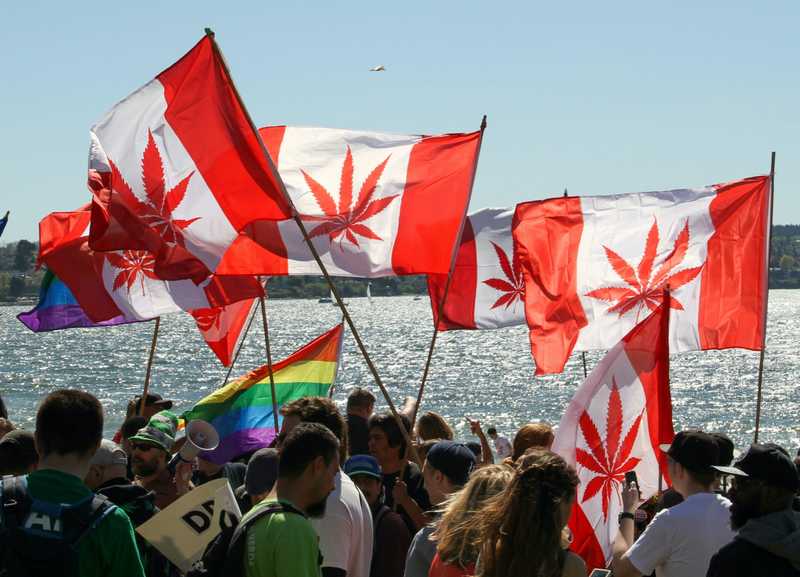All the chaos predicted for legalization of cannabis in Canada has come to pass. Government and government-regulated marijuana stores and online retailers have fallen short, or completely run out of product. And the situation was made worse by rotating Canada Post strikes and an unfortunate hacking of Canada Post’s tracking website, which exposed the personal information of 4,500 Ontario Cannabis Store customers.
Both recreational and medical marijuana consumers have complained about the lack of supply, the absence of choice and high prices of the legal cannabis products. And at the same time, as the police are cracking down on the unlicensed dispensaries on the grey market, few of the provinces have enough, or any, storefront dispensaries to take over.
The result of all this is that the black market for cannabis continues to thrive.
“All of this compounds to create a situation where people feel that they have to go to the black market,” says Peter Thurley, a member with Canadians for Fair Access to Medical Marijuana in Kitchener, Ontario. “I'm partly using the black market myself, simply because it's not affordable to get all my medicine from the legal market.”
To avoid police crackdowns, many illegal suppliers are moving to the internet, selling cannabis for as little as $3 a gram, often losing money to deliberately undercut legal suppliers. These online ventures don’t advertise what they’re doing is illegal as they offer money-back guarantees, coupon codes for discounts and a selection of products not legally approved, including edibles, strong concentrates and cannabis topicals.
Some even have customer helplines, organic and pesticide-free products, and marijuana specifically aimed at medical users.
The Grey Cannabis Market Turns to Black
Not only are unlicensed dispensaries targeted by police, many are closing down voluntarily, at least temporarily, in the hopes they’ll eventually snag a license to do business legally. In doing so, the shrinking grey market may be feeding the black market for marijuana in Canada, with an estimated worth between $6–8 billion.
RELATED: WILL CANNABIS LEGALIZATION SHUT DOWN THE GREY MARKET
The dispensaries are fulfilling the prophecy of an Ontario cannabis trafficker interviewed by Vice Media last month, who said, “The grey market is going to collapse overnight and we’ll see a massive return to the traditional black market.”
On his way to earning $300,000 this year from illegal cannabis sales, this illicit cannabis supplier claims that technology including smartphones and apps like Instagram are allowing the black market to thrive and make it hard to contain. “Until you shut down people’s phones you will never be able to shut down a black market of any kind,” he warned.
Illegal Cannabis Dispensaries Down but Not Out
An Oct. 29 New York Times article about Vancouver’s struggles with the black market begins: “In the pot-friendly city of Vancouver, illegal marijuana dispensaries outnumber Starbucks outlets . . .”
And one of the most prominent chains is Weeds, Glass and Gifts, run by 67-year-old Don Briere, a cannabis crusader who’s often in the news and was once sentenced to four years in prison for being a scofflaw.
Not only does Don refuse to shut down his four Vancouver stores, but his stores continue to sell products not available through licensed producers (LP). LPs are limited to:
- Fresh or dried cannabis
- Marijuana seeds
- Cannabis plants
- Marijuana oil
Besides the marijuana edibles and concentrates Don sells that the legal market doesn’t, he’s even planning to introduce canine cannabis treats to his stores, purported to reduce doggie anxiety.
RELATED: SHOULD I USE CBD TO TREAT MY PET’S ANXIETY?
The trouble seems to be the Canadian federal and provincial governments lack the means and the will to tackle the true extent of the illegal market.
“The government taking over the cannabis trade is like asking a farmer to build airplanes,” says Don.
Despite his defiance, Don, who once owned 36 dispensaries across the country, has shut down nine stores in Alberta, Saskatchewan and Ontario, to aid his application for government licences. But in the meantime, he’s directing former customers to his company’s definitely not legal online shop.
Photo credit: Cannabis Culture
